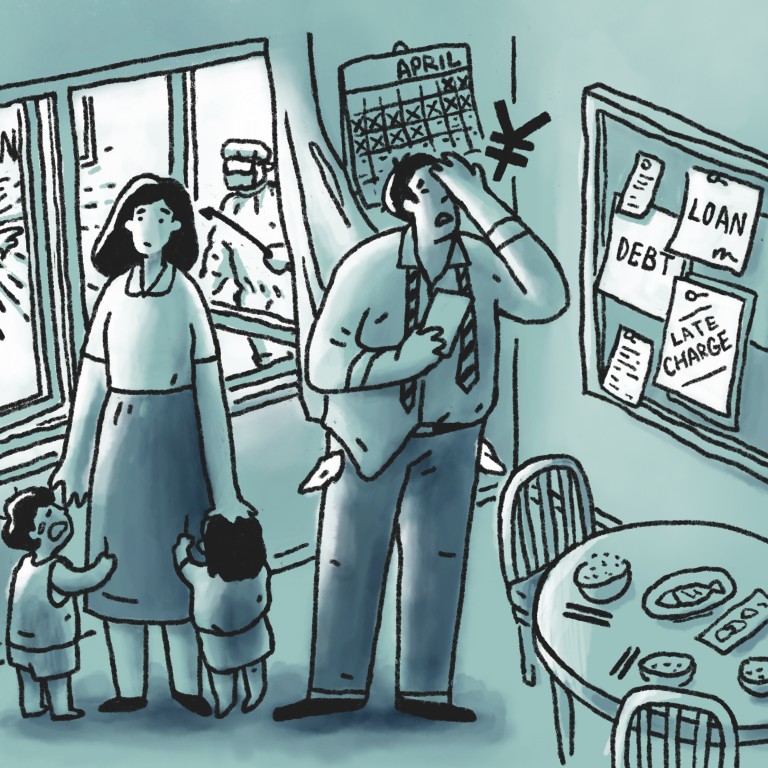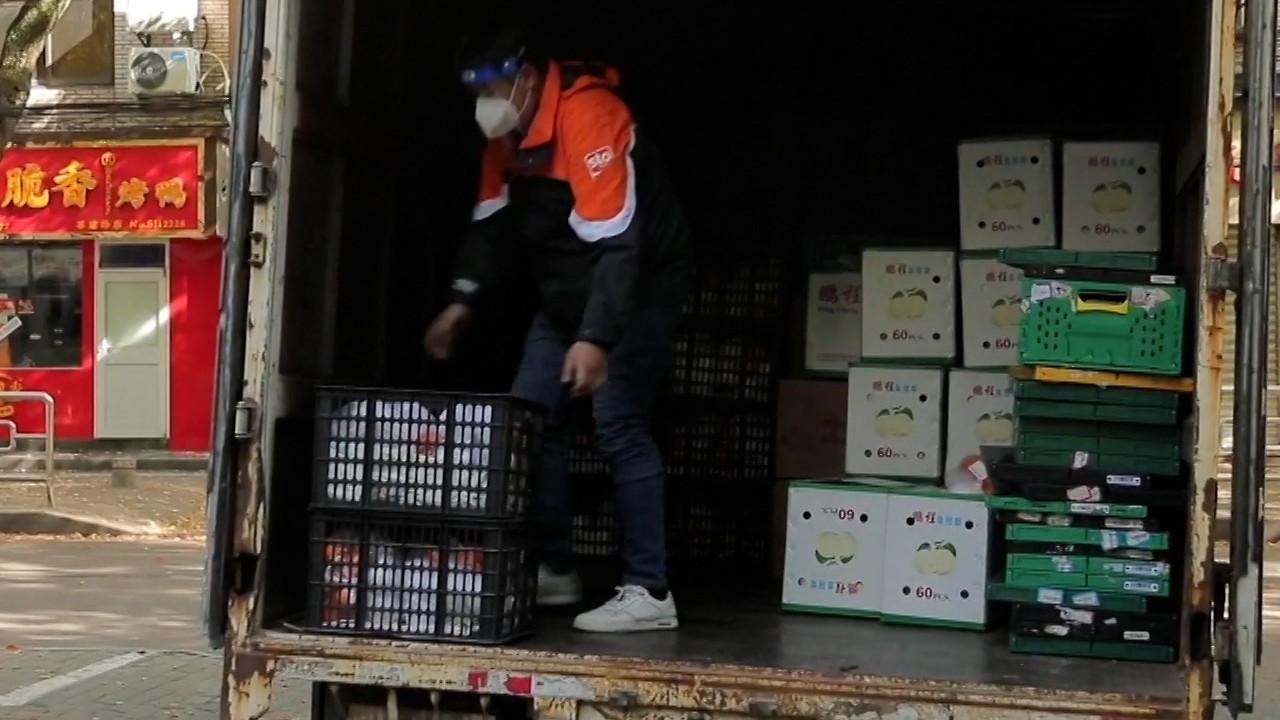
China’s rising household debt is shattering dreams of financial freedom, and ‘fears are spreading’
- Salary reductions, lay-offs, lockdowns and regulatory crackdowns are upending the lives of those who were once the envy of China’s middle class
- If coronavirus-induced lockdowns and restrictions drag out for more than two months, some warn that the impact could be ‘unimaginable’
Across China, people such as Eli Mai, a 40-year-old sales manager at a consulting firm in Guangzhou, were long held up as the envy of the middle class – empowering examples of what could be achieved with a decent job.
But that was back when China’s economic growth was the envy of the world.
Today, even as he owns two properties and remains employed, Mai is buried in debt and constantly worries about losing his job in the face of poor economic prospects and mounting pressure from both domestic and international sources.
His salary has been slashed in half due to lost commissions, and he is pulling in about 10,000 yuan (US$1,570) a month. Meanwhile, his family’s total debt has ballooned to a whopping 3.5 million yuan.
“My hair has turned quite white in the past six months, and I am afraid day and night that I will not be able to make the [monthly loan] payments,” he said, adding that these have surpassed 25,000 yuan – more than the current combined income of Mai and his wife, a teacher.
In the past seven years, Mai took out several loans, with repayments ranging from 1.5 to 30 years. These include mortgages, a personal housing provident fund loan, consumption loans and personal credit loans. He has also amassed credit card debt and borrowed money from relatives and friends.
And he used his first apartment, purchased in 2011, as loan collateral for the second.
Situations like Mai’s are more common than some may realise, and they serve as a warning sign of mounting debt risks among middle-income and working-class households in the world’s second-largest economy.
China’s strict coronavirus control measures, such as lockdowns in key financial and manufacturing hubs, have disrupted business, crippled consumption and cast a cloud over an economic recovery that had already been losing steam since the second half of last year.
Economists have made downward revisions to their economic-growth estimates for the year’s first quarter, noting that lockdown-inducing Omicron outbreaks have put an end to upbeat economic indicators seen in January and February.
But Beijing remains unwavering in its zero-Covid approach, fuelling worries over the mounting economic costs of staying the course – a strategy that some critics say worked better for China in its fight against less-contagious earlier variants of the virus than against Omicron.
Fears of falling incomes and losing jobs are spreading here. No one can afford to lose their job
Meanwhile, personal debt keeps rising, and even some of the most affluent members of China’s middle class are wrestling with fears over what comes next.
Tomas Lei works for one of the country’s leading internet companies in Hangzhou, a hub for internet and e-commerce firms in eastern China’s Zhejiang province. And he’s considered to be among the wealthiest members of China’s middle class.
But he and his colleagues are trying to come to grips with what has been a curtailing of China’s tech giants over the past year. Coupled with a cooling economy, Beijing’s crackdowns resulted in large-scale lay-offs, shrinking salaries and frozen headcounts.
“Fears of falling incomes and losing jobs are spreading here. No one can afford to lose their job. Other industries in China only offer much lower incomes and cannot support our high household debt,” said Lei, who owes 30,000 yuan a month in payments on an apartment, a condo and a Mercedes-Benz.
Dreams of midlife financial freedom, with their shareholdings in tech companies valued in the millions or tens of millions of yuan, have largely been shattered.
“There are a lot of internet company employees like us, in our thirties, who bought one or more properties worth millions of yuan in the past two years, with a monthly mortgage of tens of thousands of yuan,” Lei said.
“Stocks and year-end bonuses account for most of our income, while our fixed monthly salary is just a small part.
“In just two or three months, the wealth on the books of many US-listed Chinese companies has dropped by 70 per cent or more. That equates to our annual salaries being down by a third or more from last year.”
Meanwhile, the tech downturn appears to be lowering the value of real estate in Hangzhou. Lei said housing prices where he lives in Xihu district have dropped from more than 60,000 yuan per square metre last year to around 50,000 yuan now.
Additionally, the incomes of those selling wealth-management products, mutual funds and other financial products have also dropped significantly, according to Alice Chen, a customer manager at a Shenzhen-based private investment fund company.
If the epidemic-led lockdowns and restrictions last for more than two months, the impact is unimaginable
“The economic downturn, geopolitical conflicts, the epidemic and US inflation will [affect] the investment market and domestic demand. If the epidemic-led lockdowns and restrictions last for more than two months, the impact is unimaginable,” she said.
The leverage ratio of households – measuring their indebtedness in relation to their income – had climbed to 62.2 per cent by the end of 2021, from less than 5 per cent in 2000, surpassing the level of Germany and nearing that of Japan, according to a quarterly report released by the National Institution for Finance & Development (NIFD) in February.
“A rapid rise of the household leverage ratio would affect the stability of the financial system. A key fuse for the global financial crisis in 2008 was the overly high debt in the household sector. In China, the risk of household debt is highly relevant to the situation in the property market, and in terms of income growth and wealth distribution,” said the report, which was co-authored by economists Zhang Xiaojing and Liu Lei.
Long viewed as a major engine fuelling China’s economic growth, its property sector accounts for a quarter of all fixed-asset investments and nearly one-third of all residential assets, while developers and homebuyers take out more than a quarter of all bank loans. But a slew of government curbs over the past two years have struck hard.
Real estate investment growth fell to a 22-year low of 4.4 per cent last year, and slowed to 3.7 per cent during January and February, year on year. And the amount of floor space sold grew by just 1.9 per cent last year, according to data from the National Bureau of Statistics.
“Stabilising the property market is crucial to stemming risks in the household sector,” the NIFD report said.
As property prices tumble, even dropping below the value of the mortgage, some owners have chosen to suspend loan repayments.
As of December 21, more than 1.69 million real estate properties were listed on a single internet auction platform of Taobao by local courts, surging from 500,000 units in 2019.
More than 60 cities across China eased property curbs during the first quarter, showing how stability is being prioritised in the slumping sector.
Measures included reducing down payments, subsidising home purchases, cutting mortgage interest rates and offering financial support to developers.
State media reported that some banks, including state-owned lenders, have extended mortgages for homebuyers who saw their incomes cut due to coronavirus controls, including the lockdowns in Shanghai, the epicentre of the current Omicron wave.
Simon Zhao, a professor of social sciences at Beijing Normal University, also pointed to the risk of rising household debt among families in hundreds of China’s smaller cities, including rural areas.
He noted that a large number of migrant workers – many with mortgages in their hometowns – are struggling as factories suspend production because of zero-Covid policies.
Zhang and Liu added that while overall risks appear under control, the breakdown of cash flow for some households could mean serious trouble.
They said employees in the low-end services sector, self-employed individuals and migrant workers are especially vulnerable to the pandemic hit, and the income volatility among those groups could put even greater pressure on overall household debt.
“An important lesson from the subprime crisis in the US is the overly high debt of the household sector, with a much higher leverage ratio among low-income families than high-income ones,” they said.
The Southwestern University of Finance and Economics, which has been tracking China’s household finances, also confirmed that the wealth of low-income households continued to shrink toward the end of last year.
Vivi Chen and her husband, who both work in the Shenzhen-based financial sector, bought two downtown properties in 2019 and 2020, during a financial and real estate boom in the southern city.
But with the weakening property and stock market this year, Chen said she felt uneasy about the rising risks posed by household debt and has opted to cut back on consumption, even though the couple’s assets have a combined market value of more than 18 million yuan (US$2.83 million).
I’ve worked hard for more than 10 years to get into the rich middle class. And now I’m at risk of falling out of this class
“I have to budget carefully and will not spend lavishly on clothes, for example,” Chen said. “I won’t buy a dress over 500 yuan – don’t think I can afford it.”
According to a first-quarter survey by the People’s Bank of China, of 20,000 urban households in 50 cities across the country, 54.7 per cent of households were looking to increase their savings, up from 51.8 per cent in the previous quarter.
It also showed that only 21.6 per cent of those polled had plans to increase their investments, down from 23.5 per cent in the fourth quarter.
Not knowing if they will even be able to keep their jobs if the economic situation worsens, both Mai and Lei said they were considering selling property.
“It’s just hard to find a buyer now,” Mai said.
“On the other hand, it also makes me extremely frustrated. I feel that I’ve worked hard for more than 10 years to get into the rich middle class. And now I’m at risk of falling out of this class.”


